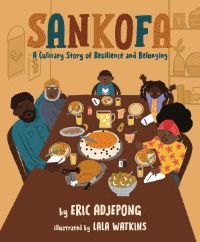Sankofa : a culinary story of resilience and belonging
 Sankofa : a culinary story of resilience and belonging
Sankofa : a culinary story of resilience and belonging
Picture Book / Ghana / Ages 4-8
Penguin
October 3, 2023
49

Inspired by acclaimed chef Eric Adjepong’s own childhood, Sankofa is the... story of a young boy’s culinary journey 400 years into the past to reconnect with his African roots and find his own place in America.
Sankofa, by renowned chef Eric Adjepong, is the beautiful and heartwarming story of Kofi, a young Ghanaian diasporic boy who grapples with his identity as he seeks to identify what dish to bring to his school potluck. The settings are his classroom, his family, and the local market, all in the United States. When Kofi’s teacher reminds students that they must bring a dish from their “culture,” Kofi freezes. He fears that bringing a Ghanaian dish will increase the sense he has that he is different from the rest of the class and he worries about being othered. This feeling is compounded by the fact that he has trouble identifying with Ghana since he, unlike his grandfather, parents and sister who were born and raised in Ghana, was born in the United States. To add to Kofi’s anxiety, his parents, both busy as working parents, tell him there is no time to prepare a dish. Thankfully, Kofi’s grandfather, Nanabarima, invites Kofi to the market to “let the ingredients speak.” The tale then unfolds with Nanabarima leading Kofi to “listen” to the story the ingredients tell, scaffolding Kofi toward an understanding of his Ghanaian identity through food, to ultimately culminate in Kofi joyfully bringing a delicious jollof rice dish to his classmates on Monday.
There are many aspects of Ghanaian Akan culture to learn about in this book. Readers will appreciate learning Twi phrases that are scattered throughout the story such as “ Wo ho te sεn?” (How are you), complete with specific Twi lettering. The title itself is a Ghanaian Adinkra symbol that invites us to go back to look at the past. The harvest of foods such as turmeric and plantains is described in detail. We learn of typical grains like fonio and rice. A very meaningful trans-Atlantic linkage in rice cultivation is highlighted when Nanabarima describes that South Carolina Gold Rice came from West Africa, brought by people who were forced into slavery by braiding grains of rice into their hair.
Themes that this book masterfully brings to the fore are: the ways identity is grounded not only in food but in family; the role and importance of intergenerational transmission of knowledge; feelings of belonging and how complicated this can be when growing up in a diasporic family; creativity in assembling foods that tell a story; ancestral resilience as a source of hope and meaning; and the relatable aspects of daily life, such as school-based assignments, eating as a family, and working parents. These are all themes that students will enjoy connecting to in one way or another.
A teachable moment on language for teachers who use this book: while the author uses the word Akan tribe to describe Kofi’s ethnicity, the word tribe carries heavy colonial historical meaning so it is important to point out to young readers that in-group members can choose to use this word if they wish, but that out-group members should not use it to not reproduce colonial meanings. This is a lesson that can expand to other words as well. A useful commentary about language use by Ta-Nehisi Coates can be viewed here. Another useful lesson in critical thinking that this book may be used for is when the author uses “African culture.” Here, teachers can ask students “Is there such a thing as an African culture?” followed by a discussion of how culturally diverse the continent is, with its 54 countries, 2,000+ ethnicities, and 3,000 languages.
These two above points notwithstanding, this is an excellent book that readers, young and old, will delight in and learn from. The story is autobiographical since author chef Adjepong describes this story as his own. If readers want the pleasure to hear the book read aloud by the author, they can view this here:https://www.youtube.com/watch?v=NLXqXcLHG-Y
Elsa Wiehe, Ed.D.
Boston University
Published in Africa Access Review (April 22, 2024)
Copyright 2024 Africa Access
